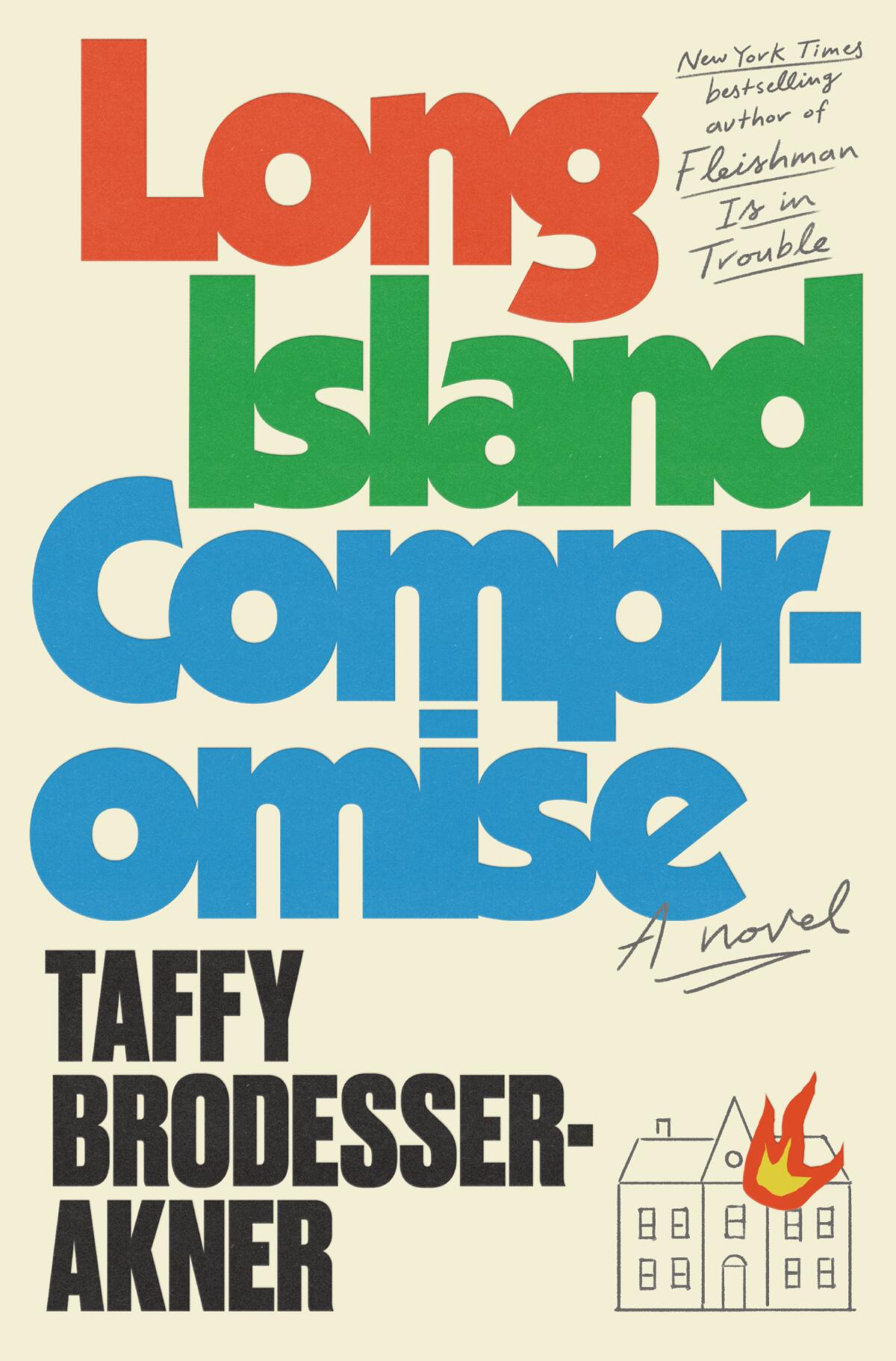‘Long Island Compromise’ joins the pantheon of great American novels

- Share via
Book Review
Long Island Compromise
By Taffy Brodesser-Akner
Random House: 464 pages, $30
If you buy books linked on our site, The Times may earn a commission from Bookshop.org, whose fees support independent bookstores.
“Do you want to hear a story with a terrible ending?”
Taffy Brodesser-Akner had me at “hello” with this opening line from her raucous and ravishing “Long Island Compromise,” an epic family saga that joins the ranks of such great American novels as “The Corrections” and “Middlesex.”

Brodesser-Akner, a journalist, has long brought magic to the art of the profile, and her blockbuster literary debut, “Fleishman Is in Trouble,” made it necessary to read while underlining sentences to later text to friends or inscribe on Post-its for future inspiration. But for all its clever repartee, her first novel is also a savvy and even profound indictment of sexism and misogyny, although the author almost charms us into not noticing.
“Long Island Compromise” is even more ambitious and suggests that this author’s talents are boundless. It opens in 1980, when a super-rich factory owner named Carl Fletcher is kidnapped in the driveway outside his Middle Rock (Read: Great Neck, Long Island) mansion. He’d been about to get into his Cadillac Fleetwood Brougham and drive to work when “a man leapt from behind onto Carl’s back and hooded him in one fast, balletic move,” turning his “world to black.”
At home, Carl’s pregnant wife, Ruth, and their two young boys don’t suspect anything is amiss until midafternoon, when Ruth calls Carl’s office to ask if he can pick up eggs and spaghetti on his way home. His secretary, who thought Carl had taken the day off without informing her, tells Ruth she hasn’t seen him all day. Not knowing what to make of this, Ruth turns to Carl’s mother, Phyllis, the family matriarch, who immediately takes charge, and within minutes, the police and the FBI are on the scene.
The residents of this ultra-affluent community — with the Fletchers being the richest among them — are aghast that such a crime could occur within its rarefied gates. “They were speechless, they kept saying, speechless! And yet for all of their speechlessness, none of them could stop talking about it.” The Fletchers had been enviable in their wealth and position, occupying prime waterfront real estate and prominent in civic and synagogue life. But being “the pinnacle” hadn’t protected them, and Ruth reflects that maybe it was even the opposite, that “the money had tricked her” into believing she was “insulated from danger. … Look at what happened if you allowed yourself to assume that your good fortune was guaranteed simply because it was vast. Idiot!”
It’s not a spoiler to say that after five days, ransom is paid to the kidnappers, and Carl is found blindfolded, bound and handcuffed in the bathroom of a Mobil station. His trauma is a “dybbuk” that poisons the Fletchers for decades to come, not unlike “Cossacks murdering your siblings in front of you.”
The novel’s very opinionated, omniscient narrator goes unidentified but is clearly a believer that inherited wealth is corrosive and that the Fletcher children — Nathan, Beamer and Jenny — prove the point. The adult Beamer becomes a film writer who leans on his childhood friend Charlie to do most of the work on their screenplays while he consumes ginormous amounts of any available drug and sees a dominatrix once a week behind his wife’s back. After Charlie goes solo, Beamer’s career spectacularly tanks. No schadenfreude here. It’s not fun watching him crash and burn, though Beamer’s done everything humanly possible to guarantee that outcome.
Nathan, the Fletchers’ eldest son, is the polar opposite of his brother. Whereas Beamer is wild and lascivious, Nathan is eternally anxious, carrying around beta blockers in his pockets for a heart condition he doesn’t have and would be afraid to treat if he did. His wife, Alyssa, is protective of her husband’s neuroses but unaware that he is on a downward spiral, financially and professionally. He is the most dutiful of his siblings by a long shot, and while he wants nothing more than to please everyone around him, his tendency to see danger lurking around every corner is unsettling to all, especially his son, Ari, who is as nervous as his dad. There are rare and lovely moments, though, when Nathan is calm enough to comfort his son and reflects: “There are few things more validating than to see someone who is like you and love them instead of hate them. That was a surprising thing about fatherhood that Nathan had not anticipated.”
Jenny has ironically become a union organizer (her own father’s factory isn’t unionized) after trying on various other identities as a Yale student. For her, not only is “wealth a crippling starting position” but it is also a source of lifelong shame. “What is it about shame,” Brodesser-Akner writes, “that a teaspoon of it weighs so much more than a teaspoon of happiness or any other innocuous emotion? What is it about shame that it always feels like the truth?”
“Long Island Compromise” is an exploration of intergenerational trauma and an unabashed critique of income inequality — Thorstein Veblen’s “The Theory of the Leisure Class” is even invoked — but it is also uproariously funny. Ruth is not an affectionate mother, but she is like a character from an early Woody Allen movie with her deadpan quips and guilt-provoking Yiddishisms. When Jenny refuses to participate in her high school graduation ceremony because “I’m not an animal … I don’t have to perform,” Ruth responds: “Sarah Bernhardt over here!” When one of her kids addresses her not as Mom but as Ma, she counters: “Now I’m Ma. Like you were raised in the street. Bugsy Siegel over here.”
The moment in “Long Island Compromise” that moved me to tears came late, when Carl, by now much older, confronts his inability to overcome the effects of the kidnapping and contemplates forgiving himself for his role in the legacy: “Forgiveness? What would that be like? … Forgiveness for the ways he absolutely saw around him that he had stopped life for his family.… He had tried so hard. He had tried as hard as everyone else.”
I’m not going to say whether the first line of the book is prophetic, but it almost doesn’t matter. Brodesser-Akner has written a humane, brazen, gorgeous novel whose words dance exuberantly on the page.
Leigh Haber is a writer, editor and publishing strategist. She was director of Oprah’s Book Club and books editor for O, the Oprah Magazine.
More to Read
A cure for the common opinion
Get thought-provoking perspectives with our weekly newsletter.
You may occasionally receive promotional content from the Los Angeles Times.










